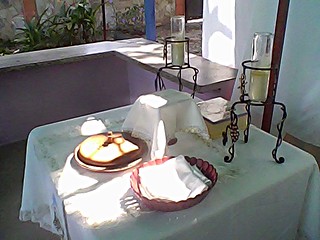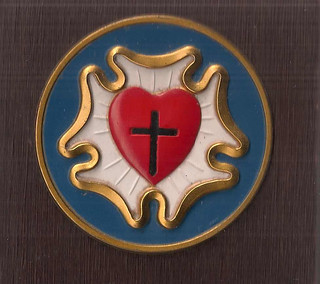On Sunday, November 1, 2020, we celebrated the 503rd anniversary of the Reformation and All Saints Day with first communion for four young women and one adult reaffirmation of faith.
November 1 is often called “the Day of the Dead” in Venezuela, but it’s not like the Day of the Dead in Mexico, with elaborate rituals involving candy skulls and offerings of food to the departed. Rather, the first two days of November are when people lay flowers on the graves of loved ones, much like Memorial Day in the United States. As with the Mexican holiday and Halloween, it is related to the ancient church calendar which designates October 31, November 1 and November 2 as respectively, All Saints Eve, All Saints Day and All Souls Day. And so is the Reformation.
The tradition of All Saints Day began in the fourth century A.D. as the day to honor all who had died for the faith during 300 years of persecution by the Roman Empire. The original date was May 13 and Eastern Orthodox churches still celebrate All Saints Day on the first Sunday after Pentecost. In western Christendom, Pope Gregory III set the date as November 1 in the eighth century, when he consecrated a chapel to all the martyrs in Saint Peter's Basilica in Rome.
In time, a prayer vigil on the preceding evening was added, which is All Hallows (Saints) Eve, from which the word Halloween is derived. Then November 2 was designated as All Souls Day in the 11th century as the day when prayers were offered for souls in Purgatory. By the end of the 12th century, it had become commonplace to ring church bells during these three days to remind people to pray for the souls of their loved ones in Purgatory. Not only was the false doctrine of Purgatory incorporated into these observances, in many regions so were pre-Christian customs associated either with harvesttime or honoring and/or placating the spirits of the dead.
Lutherans added another twist to this tradition by establishing October 31 as the anniversary of the Reformation. Martin Luther is said to have begun the Reformation when he posted his 95 Theses on the door of All Saints Church in Wittenberg, Germany, on All Saints Eve 1517. This surely was not happenstance, as the 95 Theses deal with medieval conceptions of penance, purgatory, merits of the saints and the authority of the papacy.
The Roman church still teaches that in baptism we receive redemption from original sin and eternal death. We agree and therefore recognize baptism in a Roman Catholic church. But, after baptism, when the Christian falls into sin because of the sinful nature, he must do penance, because repentance is not a change of mind and heart effected by the Holy Spirit, but an act of recompense done by the sinner. If the sinner cannot do enough penance in this life, he may suffer in purgatory before entering the eternal life promised in baptism. Suffering in purgatory is not forever, and the Pope has the authority to cut the sentence in purgatory by a letter of indulgence. This is still the teaching of the Roman church, no matter that no part of it is found in the Holy Scriptures. It is the fine print that denies the good news of the new life in Jesus Christ. This system that contradicts God's Word arose because many did not believe that we cannot do anything to receive God's grace.
Furthermore, in the Roman church, the saints are the ones who have avoided purgatory on their own merits. We can know someone is a saint when requests to this person are answered by miracles verified by the church of Rome. The treasure of the church, according to this belief, is the abundance of the merits of the saints that the Pope can apply to the account of others. This idea is not from Scripture either.
In contrast, Luther wrote thus in the theses: “Any truly repentant Christian is entitled to full remission of penalty and guilt, even without indulgence letters. Every true Christian, living or dead, shares in all the blessings of Christ and the church; and this is granted to him by God, even without indulgence letters ... The true treasure of the church is the most holy gospel of the glory and grace of God."
So this year we received five sinners by Adam’s fall and saints by Christ’s resurrection and their baptisms into the full blessing and fellowship of the church.
Rita Maria Zapata. “And, lo, I am with you alway, even unto the end of the world. Amen.” Mateo 28:20b
Yusmelvis Naikeli Salas Medina. “Delight yourself also in the Lord; and he shall give you the desires of your heart.” Psalm 37:4
Lorena Alexandra Rujano Contreras. “But you are a chosen generation, a royal priesthood, an holy nation, a peculiar people; that you should sho forth the praises of him who hath called you out of darkness into his marvellous light.” 1 Peter 2:9
Anyelimar Katiusca Meza Ruiz. “I can do all things through Christ which strengtheneth me.” Philippians 4:13
Jariannys Nathaly Rojas Arias. “Jesus sad to him, I am the way, the truth, and the life: no man comes unto the Father, but by me.” John 14:6
Answered prayer
We had a positive and productive meeting October 23, 2020, with representatives of the Ministry of Education charged with the care and education of preschool children. Most of them had not visited our campus before, and were surprised by its size and condition. They were impressed by our commitment and service to the community as a church (in the sense of a local congregation), tending to both spiritual and material needs. This bodes well for when we reopen regular classes in January. For now, our teachers continue to distribute food and online lesson plans to our preschool families.
















